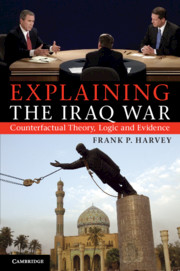Book contents
- Frontmatter
- Contents
- Figures
- Tables
- Acknowledgments
- Introduction
- 1 Comparative counterfactual analysis and the 2003 Iraq war
- 2 Leadership, political context(s) and the Iraq war
- 3 Democratic national security advisers
- 4 Domestic and congressional politics
- 5 American intelligence failures and miscalculations
- 6 Societal pressures and public opinion
- 7 International politics, global WMD consensus and UN power balancing
- 8 Hussein’s mistakes, miscalculations and misperceptions
- 9 Summary and implications
- 10 Conclusion
- Bibliography
- Index
7 - International politics, global WMD consensus and UN power balancing
Published online by Cambridge University Press: 05 June 2012
- Frontmatter
- Contents
- Figures
- Tables
- Acknowledgments
- Introduction
- 1 Comparative counterfactual analysis and the 2003 Iraq war
- 2 Leadership, political context(s) and the Iraq war
- 3 Democratic national security advisers
- 4 Domestic and congressional politics
- 5 American intelligence failures and miscalculations
- 6 Societal pressures and public opinion
- 7 International politics, global WMD consensus and UN power balancing
- 8 Hussein’s mistakes, miscalculations and misperceptions
- 9 Summary and implications
- 10 Conclusion
- Bibliography
- Index
Summary
The evidence from preceding chapters reveals serious weaknesses with standard neoconist accounts of the Iraq war. When exposed to the facts, the conventional account emerges as an excessively simplistic take on American leadership, domestic politics, US–UK intelligence failures, media coverage and public opinion. So much of what is relevant to telling the whole story is excluded in traditional narratives, no doubt because many aspects of the historical record directly challenge accepted wisdom. As it turns out, the truth is so much more interesting than the story of a few ideologues in the Bush administration – clearly, they were not solely responsible for transforming the direction of American foreign and security policy after 9/11. Moreover, they did not have the intellectual prowess, political authority or negotiating skills to manipulate the preferences, perceptions and priorities of so many other very intelligent people in Washington, including a significant majority of both political parties, members of whom served on key congressional foreign policy and intelligence committees that authorized the use of force, and a majority of the American public (between 60 to 70 percent) who consistently supported Bush’s handling of the Iraq crisis from 2002 to 2003.
But problems with the most widely accepted account of the Iraq war are not limited to simplistic historical portrayals of American leadership or domestic politics during this period – neoconism also assumes that these same powerful ideologues managed, through sheer willpower and political skills, to shift the focus of an entire international community to accommodate the neocons’ Iraq policy. Consider the list of world leaders whose perceptions and priorities, neoconists believe, were successfully manipulated to serve a misguided agenda: Tony Blair and a significant majority of British parliamentarians from both major parties who supported the war effort; Prime Minister John Howard of Australia and a majority of the Australian parliament; leaders from almost every European government excluding France, Germany and Belgium; every member of the UN Security Council (including France, Russia and China), which unanimously endorsed UN Security Council Resolution 1441 (a clear summary of the global intelligence consensus on Iraq’s “material breach,” failure to disarm chemical and biological weapons programs and suspicions about “nuclear facilities”); and a significant majority of Iraqi citizens who, despite being threatened with death, voted in the democratic elections at the center of the Bush-neocon empire-building scheme. Space constraints preclude a more detailed list of world leaders and senior military officials scammed by Bush, Cheney and their neocon team.
- Type
- Chapter
- Information
- Explaining the Iraq WarCounterfactual Theory, Logic and Evidence, pp. 195 - 240Publisher: Cambridge University PressPrint publication year: 2011



